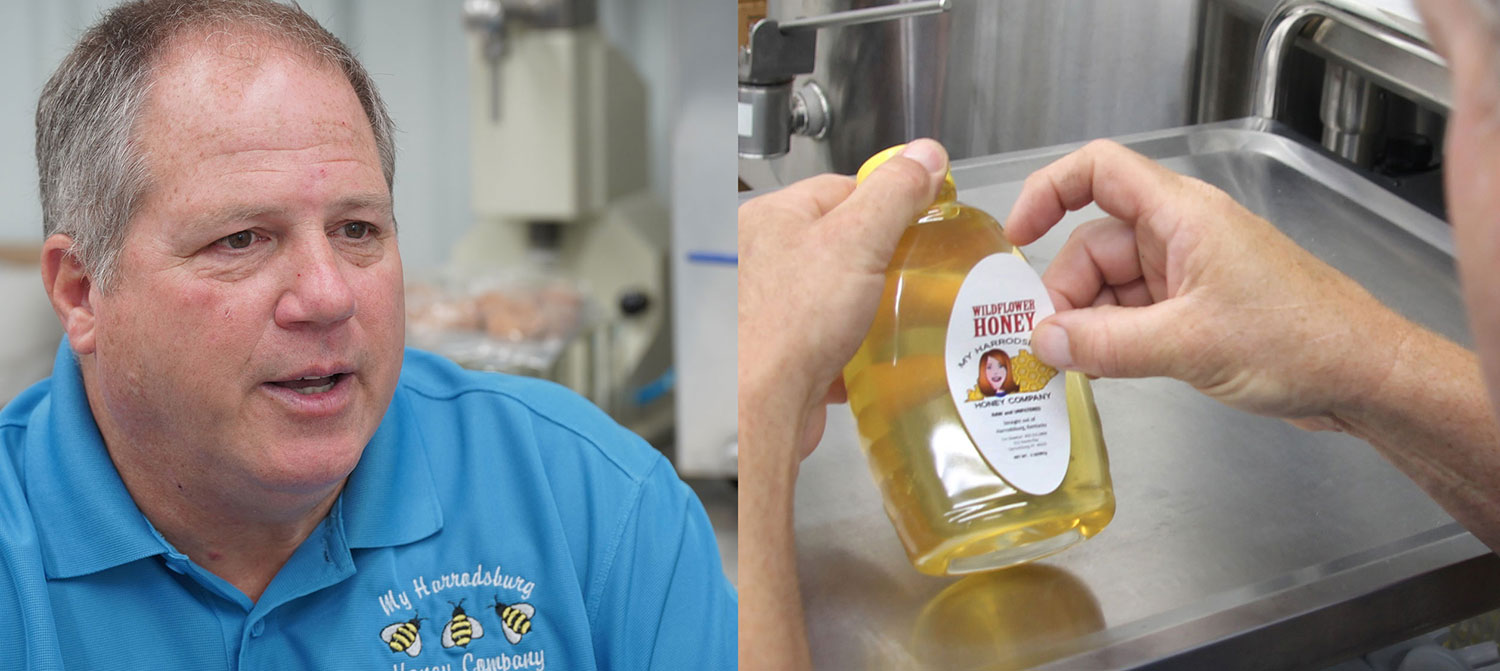
Tim Sheehan uses modern equipment to process 6,000 pounds of honey per year on his Mercer County farm. On the right, Tim Sheehan attaches a label bearing his wife’s likeness to a bottle of wildflower honey.
JUNE
Mercer County beekeeper keeping Ky. sweet during Pollinator Month
By Chris Aldridge
Kentucky Ag News
HARRODSBURG, Ky. (June 24, 2024) – Each bottle of local honey from beekeeper Tim Sheehan’s My Harrodsburg Honey Company bears the likeness of his wife, Lori.
“He wanted to put my picture on there because I’m his Harrodsburg honey,” she joked.
Each bottle also boasts two stickers: one from Kentucky Proud, signifying that the honey was processed and bottled by a Kentucky company, and one from Kentucky Certified Honey, assuring consumers that the honey was sourced in Kentucky from beehives nearby.
“That's why it's so important to look for those labels or know your local beekeeper. You can go to the Kentucky State Beekeepers Association web page, and it has the Certified Kentucky Honey producers on there…. That's really the only program that you have to be local.”
Tim has been a beekeeper for nearly two decades but has only been a honey producer for the last 10 years. He collects and processes about 6,000 pounds of honey per year from as many as 150 hives on his farm and at several other sites in Mercer County.
Tim has 25 hives at nearby Shaker Village and has a contract to supply the tourist attraction with the honey used to make and supplement its seed-to-table meals for breakfast, lunch, and dinner.
“Honey that comes from those hives is processed and held separately here,” Tim explained. “It goes back to them in the form of glass bottles that they sell in their gift shop under their label and then in 2-gallon buckets … for cooking in their kitchen.”
My Harrodsburg Honey is sold at grocery and hardware stores in Harrodsburg and nearby Lawrenceburg and Wilmore, as well as the Olde Bus Station Restaurant in Harrodsburg and Leestown Coffee House in Lexington.
“We don't have any trouble marketing our honey,” Tim said.
Tim gave his wife credit for a new marketing outlet – wedding favors.
“A friend of ours had out-of-town guests coming in for a wedding, and they wanted to put together a Kentucky gift basket,” he said. “She (host) said, ‘Do you have anything small that we could put in there?’ So, we came up with these little 4-ounce jars of honey.”
Tim said the little glass bottles of honey with a cork stopper fetch the highest price he can make for his honey, about $16 per pound.
But profit wasn’t what Tim was looking for when beekeeping became his full-time hobby following his retirement nine years ago from the Kentucky Division of Forestry. He calls beekeeping his “addiction.”
“I started out with just a couple hives in the backyard to pollinate my garden and a couple fruit trees,” he said, noting he’s reached his limit at 150 hives.
Tim, who grew up with his seven brothers and sisters in rural Jefferson County, caught the honey addiction from visits to his grandmother’s house in Henderson, Ky.
“There was always a big bowl of honey on her table,” he said, noting his great uncle, Tom, was a beekeeper who kept the bowl stocked with a fresh honeycomb. “It was like candy…. When you went to grandma's, her bottomless bowl of honey was something pretty special.”
Unlike most food, honey remains unspoiled indefinitely without refrigeration. It has natural preservatives that prevent the growth of microorganisms.
What does Tim enjoy most about beekeeping? “There are days when you get to go out there and there's a nice breeze, it's a sunny day, your smoker stays lit, and then you open up a hive, and … it's a beautiful thing,” he said. “It's wall-to-wall brood (developing bee larvae) and the queen is in there crawling around. She’s big and beautiful, and you're like, ‘Wow, this is beekeeping!’”
Being a beekeeper is nurturing the fascinating creatures that play a crucial role in pollinating Kentucky crops. According to the United Nations Environment Programme, of the 100 crop varieties that provide 90 percent of the world’s food, 71 are pollinated by bees.
“Seventy to 80 percent of what we eat relies on pollinators,” Tim added. “Your fruits and vegetables – without pollinators, you'd have nothing.”

